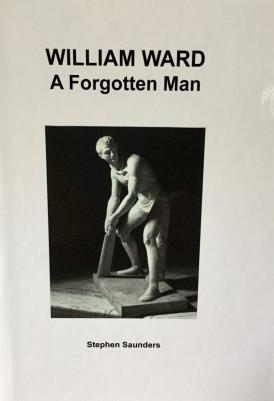William Ward – A Forgotten Man
Martin Chandler |Published: 2019
Pages: 276
Author: Saunders, Stephen
Publisher: Saunders, Stephen
Rating: 3.5 stars

Is the title accurate? I’m not entirely convinced, at least in the case of those of us of a certain age, that it is right to describe William Ward as a forgotten man. I would stress that, of course, there is no one alive today who remembers his day in the sun, 24 July 1820, but I instantly recognised his name. As a child, when I pored over my father’s collection of Wisden, more particularly its records section, I often noted the footnote every year to the fact that Ward, with his 278 for MCC against Norfolk, occupied fourth place, jointly with Donald Bradman, in the all time list of high scores at Lord’s – the list last appeared in 1994.
What I did not know about Ward was that there were many other interesting aspects to his life. He was a successful financier, and rose to be a director of the Bank of England before he was 30. When Thomas Lord wanted to sell his eponymous ground to a property developer in 1825 it was Ward who stepped in to purchase the remainder of the lease and rescue the historic ground from being built on.
Ward was also an active Tory member of parliament between 1826 and 1831, although in time he suffered a reversal of fortunes and was made bankrupt. His was a time when it was possible for businessmen to trade via companies, but English law did not permit limited liability until 1855. A problem over money due to a family trust was the source of Ward’s business failure.
With so much going on in his life Ward’s story is therefore an interesting one on any level and, remarkably, thanks to Stephen Saunders he has now become the third man on the pitch in that historic match in 1820 to have his biography published in the 21st century. The other two are Lord Frederick Beauclerk, who shared in a considerable partnership with Ward in the match and, playing for the opposition and certainly the best known of the three, Fuller Pilch. Mike Thompson’s biography of Beauclerk was published by Christopher Saunders in 2017 and was reviewed here. Pilch featured in the ACS lives in cricket series in 2010 in a book written by Brian Rendell.
Where Saunders, and accordingly his reader, are fortunate is in the amount of archive material available. There were many newspapers in the early 19th-century but more helpfully extensive archives are retained by the Bank of England, the House of Commons, the MCC and Ward’s alma mater, Winchester College. Five generations on Saunders was also able to track down two descendants and they were able to provide him with an original account book covering the period.
Any enthusiast who enjoys the book now owes a debt of gratitude to Saunders because, the availability of material notwithstanding, and in many ways because of it, Saunders must have spent many, many hours in putting the book together. The most important question therefore is whether or not, given that he was doubtless dealing with some fairly dry source material, Saunders has been able to make the narrative an interesting one and I am pleased to report that by and large he has.
The Ward family was an extensive one and the book is not short on digressions on the subject of some of the other members of it. In particular Saunders dwells at some length on Ward’s daughter, Georgiana, and a ghost story relating to her home in Canada.
William Ward: A Forgotten Man book is self published, always an additional challenge for an author, and with all due respect to Saunders it is clear that a professional publisher has not been involved in me production of the book. That said I have seen many inferior publications of this type and the book is a robust hardback. It is exceptionally well illustrated and contains a number of interesting reproductions of original source material, paintings, buildings and other relevant items. In particular there is a transcript of the evidence given by Ward to the Committee of Secrecy on the Bank of England Charter in 1832 and of an article from a journal on the subject of Georgiana’s haunting.
A particular matter on which I was going to make complaint was the quality of the reproduction of some of the images and the fact that, by reason of the size of the fonts involved, the difficulty of reading them. On reflection I am however going to withdraw that criticism, but in doing so also offer a word of advice. For reasons that I do not fully understand William Ward: A Forgotten Man, particularly if you intend to read those original documents is much, much better read in natural rather than artificial light.
*Copies of the book are available from the author at £24 inclusive of UK postage. Stephen can be contacted at oastcottage@btinternet.com. For those in the Southern Hemisphere I believe Roger Page will shortly have the book in stock






Leave a comment